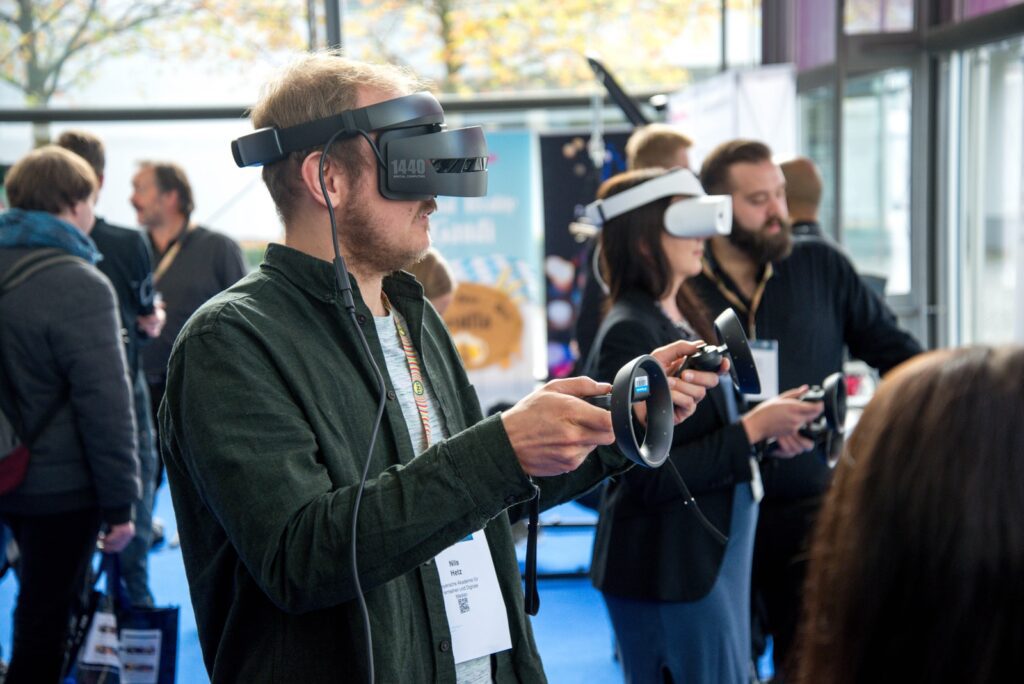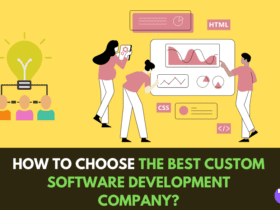With the beginning of the fourth phase of the industrial revolution, the era of emerging digital technologies and automation has just begun. It is gradually consuming our physical world by storm. Traditional practices are getting replaced by advanced tools and technologies.
Today businesses across industries worldwide are incorporating interactive technologies like IoT, Artificial Intelligence, AR, VR to transform their processes and ensure steady development. This has greatly helped and is still enabling enterprises to enhance their digital presence and establish benchmarks with trendsetting products and services.
Among the popular tools that are being used currently, VR has gained immense prominence as it has made industrial training highly immersive and purposeful. Sectors like healthcare, manufacturing, retail, hospitality have already imbibed this technology. However, VR has more prospects in this segment and lots more industries are still waiting to avail it for growth and development.
Even startups all over the world are keen on adopting VR to kick start their journey. Virtual Reality as technology has truly made learning interactive via reciprocal training and has also focused on making collaboration captivating.


Now the question is……………..
What is VR Training and How is it Better than Conventional Methods?
VR for Training has a deeper meaning. Real-life experiences are simulated via this platform. Using advanced display, this technology mimics the actual environment to make it a replica of the real world. In other words, it generates a virtual world through an immersive computer-created atmosphere to engage our sensory organs.
This process compels our brain to believe that our surroundings are real. Aspects like training, designing, and entertainment have undergone a sea change with VR impacts. But training based applications are found to get the maximum benefits with VR usages.
Listed below are some of the benefits of VR training compared to conventional techniques.
Benefits of VR training
Reduces Training Cycle
VR for training is significant to reduce the complexities of real-time problems and enable the users to gain expertise through repeated practice sessions. Here the employees do not have to visit the actual place for identifying the issues. By practicing through VR training, the trainees can learn how to respond to specific situations and also can retain the information acquired in the form of muscle memory. For the users, it improves the pace of learning and also provides an opportunity to perform all critical tasks possible within a controlled environment.
Reduces Risks of Accidents
More practice sessions on virtual platforms not only increase the retention power and muscle memory but also curbs occurrences of risky scenarios. Training imparted with virtual equipment teaches the users to know the correct techniques of using high-end or advanced machinery. Once they learn the proper ways of working with suitable instruments, the chances of accidents also become less. Thus through repetitive practices, the trainees become proficient in responding to particular situations resulting in meeting business aims and objectives effectively. This ensures safety among your employees and makes them motivated to perform better and with sincerity.
Lessens Training Cost
Making an industrial training app for your business can greatly help you to put a check on your training and development budget. VR uses simulated devices to deliver realistic experiences which results in making the use of real machines reduced. As the working hours get reduced, the cost also comes down. This saves time and also enables in making the training purpose effective within a short period.
Improves Knowledge Retention
The use of VR intensifies retaining the acquired knowledge via repetitive exposure to industrial issues and the use of simulated machines. The more exposure, the better for the trainees to improve their muscle memory and gain proficiency to execute the assigned roles and responsibilities. As all the instinctive responses get stored in the brain, the users can improve their cognitive skills and make quick decisions in less time. An established app development company with VR proficiency can be consulted to avail tailor-made solutions and make the employees equipped with the latest skill sets. Furthermore, if the employees can perform their tasks better, the lesser will be the chance to commit errors or experience any hazardous situations.
Workflow Simulation
Intensive practice of the industrial work cycle and highly interactive training are being offered via VR. Employees can become more efficient at work by getting trained in VR platforms as they can pick up the operational skills without involving any additional expense. This truly facilitates the companies to escalate their productivity and stand out in the current competition. To bring in the much-needed transformation in your business processes, this technology plays a pivotal role. VR improves your quality of work-life to create trends and establish benchmarks.
What are the Industries where VR has Greatly Impacted the Training Process?
VR has been used profoundly by plenty of industries to improve the core competencies of their employees. Take a look below at how VR has impacted the following ones.


Retail:
This is one of the industries where VR has contributed a lot in making measurable achievements. Right from handling customer queries to developing new products, from upgrading the existing ones to identifying the changes in the buying behavior, employees are being trained in diverse aspects to ensure loyalty and satisfaction among the customers across the globe. Here VR based training enables the employees to streamline their tasks and impressively showcase the deliverables to increase attraction and improve engagement.
Healthcare:
A reputed VR app development company working on VR can offer you customized solutions to improve the efficiency of your workforce in treating patients with convenience and efficiency. Just like any other sector, training in the medical field is of utmost importance to stay updated on the latest trends and practices. From performing remote surgeries to diagnosing critical issues, from conducting investigations to operating sophisticated machinery, VR helps in covering all aspects to make the professionals thorough in their job roles.
Rehab is a necessary process to recover but often patients hate it because of the painful and long procedures. But with VR there is a hope to ease the pain. The digital experiences of VR can make rehabilitation into a compelling and fun-filled journey via the playability of video games and reward mechanics. This can engage the patients and help in promoting adherence to routine tasks. In addition to this, VR animations are also being used in certain cases to make the patients aware of the complexities of the treatment process. Interactive 3D models of patients are being rendered from MRI and CT scans and are used by the researchers to make them understand how and what will be done to treat them thoroughly.
Banking and Finance:
Referring to statistics and datasheets is highly time-consuming. But again with VR, analysts can take the help of visual representations to share trends and financial information. Through this process, facts and data can be easily understood and can facilitate the experts to arrive at effective decisions quickly. For example, the Oculus Rift VR headset is used to make the data analysis immersive for a better explanation of investment portfolios. Instead of banks, tech companies are thought to be the main source for new financial offerings by almost 75 percent of the millennials.
Entertainment:
Talking about the VR revolution, the entertainment industry is regarded as a key driver. VR games are a big craze among today’s tech-savvy players across the globe. The ability of gaming enthusiasts to communicate with the characters and objects is indeed exciting. Not only VR based games can boost the adrenaline rush of the gamers, but can also indulge them to crave for more. From capturing their imaginations to making their dreams a reality, games created using VR are apt. To stand out in the current competition, VR-based games include reciprocal controls, interactive animations and graphics, impressive art and designs, stunning UI/UX, and lots more.
Apart from gaming, there are plenty of VR implications that can be seen in the realm of multimedia. Using this technology, you can transform your office or living room into a cinema hall having seating arrangements. This won’t be any ordinary theatre. You can well scroll through your youtube feed or can even watch a Netflix show on the big screen.
Fashion:
VR has immensely transformed the previously exclusive fashion trends and runway shows. It has improved the shopping experience with innovative solutions. There has been a major shift in the popularity of 3D rendered virtual stores for the retail market which looks for innovation in this segment. For example, an eminent fashion brand Dior has brought in their own VR headset called Dior Eyes. To experience their shows, this headset provides the consumers with a realistic backstage feeling.
Hospitality:
Many times it has happened that after booking a hotel room, customers feel disappointed on their arrival regarding the proposed facilities/services. Traditional images made the room look bigger, amenities are more current and the view more spectacular. But with VR hotels and resorts provide the customers the ability to have a virtual tour before final booking. VR-based 3D photorealistic environments around any property can give you a clear picture of the value you are getting for your money. The virtual booking process depends a lot on VR technology being utilized in the hospitality sector. As per the survey conducted by oracle.com, 52 percent of the respondents believe that VR will be key in transforming the reservation system.
Automotive:
VR as an interactive technology is considered integral to add value towards customer experience. Automobile companies all over the world are adopting this technology due to its immersive attributes. From teaching kids about the risks of distracted driving to educating young ones about safe driving, VR serves various purposes with utmost ease and efficiency. For example, global brands like BMW in 2018 took the help of VR to launch its new crossover SUV and enabled the prospects to explore the interior virtually.
Marketing:
This is another vital aspect where VR has been used extensively. From promoting and advertising to market analysis and penetration marketers today take the help of VR to serve their targeted customers seamlessly. Creating a strong impression in the minds of the consumers via VR is truly engaging compared to the conventional trends. For example with virtual trials buyers can pick up their favorite products, matching size and color even without stepping out from their homes. This is also applicable for buying household items like furniture where users can even fix the place in their homes where it is to be kept.
Manufacturing:
This is another vital industry that has tasted success using VR. Workers in this industry face maximum issues when trained in conventional patterns. But with the coming of virtual reality in this place, workers can be trained in a better way. With training via VR techniques, they can know the right means of working with heavy machines and instruments so that the desired tasks can be executed smoothly. This can prevent accidents and also help in ensuring safety in the workplace.
Thus from the above discussion, you have seen that VR has a vast role in making brands prosper along with empowering employees to perform better with accuracy. Training is a continuous learning process that changes with time. Maybe whatever you are looking for now from your employees will change after 5 years depending upon time, place, and economic status. VR can assess your training requirements and devise measures accordingly to meet the purpose. Not only is it flexible but can also deliver diverse solutions as per the business targets.
Conclusion: So what are you waiting for? Are you looking for a renowned app development company to avail your solutions? Do you need solutions for that? Well VR has everything in store for you to make the training successful. Right from imparting knowledge and information to creating practice lessons, from preparing immersive courses to developing learning-based games, VR can provide all sorts of resources to enhance the skills of your existing workforce.
About the Author
Mr. Arup Roy is the founder of Red Apple Technologies, a popular name in the domain of app development. His business expertise has enabled many businesses worldwide to gain recognition.
FAQ on VR Training
What is VR Training?
VR training generates a virtual world through an immersive computer-created atmosphere to engage our sensory organs. This process compels our brain to believe that our surroundings are real. Aspects like training, designing, and entertainment have undergone a sea change with VR impacts.
What is the importance of VR training?
VR training allows businesses to simulate critical jobs in a realistic environment. Besides these, it provides immense advantages and has applications in all sorts of industries.
How VR training is better than conventional training?
VR for Training has a deeper meaning. Real-life experiences are simulated via this platform. Using advanced display, this technology mimics the actual environment to make it a replica of the real world. In other words, it generates a virtual world through an immersive computer-created atmosphere to engage our sensory organs.
What are the advantages of VR training?
Reduces Training Cycle
Reduces Risks of Accidents
Lessens Training Cost
Improves Knowledge Retention
Workflow Simulation
Which industries find applications of VR training?
VR has been used profoundly by plenty of industries to improve the core competencies of their employees. Take a look below at how VR has impacted the following ones.
Retail, Healthcare, Banking, Marketing, and many others.





























